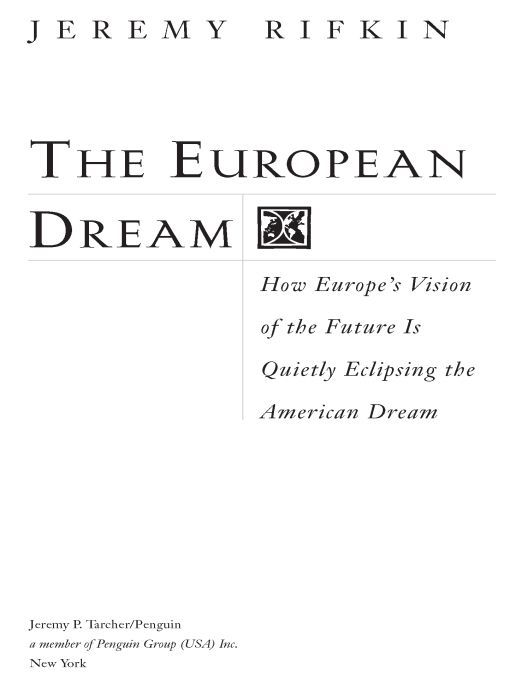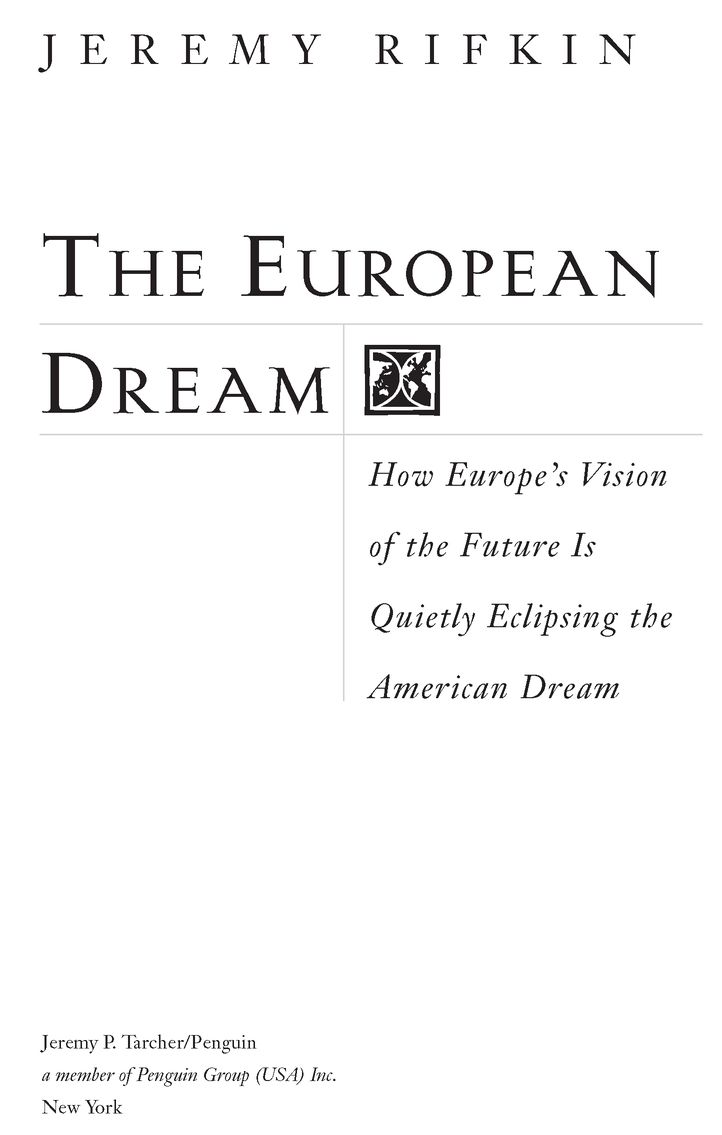The European Dream
Read The European Dream Online
Authors: Jeremy Rifkin

Table of Contents
ALSO BY JEREMY RIFKIN
Common Sense II
Own Your Own Job
Who Should Play God?
(with Ted Howard)
(with Ted Howard)
The Emerging Order
The North Will Rise Again
(with Randy Barber)
(with Randy Barber)
Entropy
(with Ted Howard)
(with Ted Howard)
Algeny
Declaration of a Heretic
Time Wars
Biosphere Politics
Beyond Beef
Voting Green
(with Carol Grunewald)
The End of Work
(with Carol Grunewald)
The End of Work
The Biotech Century
The Age of Access
The Hydrogen Economy

Most Tarcher/Penguin books are available at special quantity discounts for bulk purchase for sales promotions, premiums, fund-raising, and educational needs. Special books or book excerpts also can be created to fit specific needs. For details, write Penguin Group (USA) Inc. Special Markets, 375 Hudson Street, New York, NY 10014.
JEREMY P. TARCHER/PENGUIN a member of Penguin Group (USA) Inc. 375 Hudson Street New York, NY 10014
www.penguin.com
www.penguin.com
All rights reserved. No part of this book may be reproduced, scanned, or distributed in any printed or electronic form without permission. Please do not participate in or encourage piracy of copyrighted materials in violation of the author’s rights.
Purchase only authorized editions.
Published simultaneously in Canada
Library of Congress Cataloging-in-Publication Data
Rifkin, Jeremy.
The European dream : how Europe’s vision of the future is quietly eclipsing the American dream / Jeremy Rifkin. p. cm.
Includes bibliographical references and index.
eISBN : 978-1-101-11857-3
1. Economic development—Social aspects—Europe. 2. Economic development—Social aspects—United States. 3. Quality of life—Europe. 4. Quality of life—United States. 5. Europe—Social policy. 6. Europe—Economic policy.
7. United States—Social policy. 8. United States—Economic policy. I. Title. HC240.R.3’094—dc22
This book is printed on acid-free paper.


FOR CAROL
And for
the Erasmus generation
of college students in Europe
the Erasmus generation
of college students in Europe
ACKNOWLEDGMENTS
I
WOULD LIKE to thank Sarah E. Mann for a masterful job in directing the research for the book. Coordinating the sheer volume of material that went into the preparation of the book was a daunting challenge. Nevertheless, under Sarah’s stewardship, the process was always keenly focused and discerning. I have great admiration for Sarah’s organizational skills and her ability, under fire, to keep the research mission in hand, on track, and up to date.
WOULD LIKE to thank Sarah E. Mann for a masterful job in directing the research for the book. Coordinating the sheer volume of material that went into the preparation of the book was a daunting challenge. Nevertheless, under Sarah’s stewardship, the process was always keenly focused and discerning. I have great admiration for Sarah’s organizational skills and her ability, under fire, to keep the research mission in hand, on track, and up to date.
I would also like to thank the following people for their help at various stages of the project: Clara Mack, Alexia Robinson, Michelle Baker, Loring Katawala, Jennifer Brostek, Sima Habash, Peter Kossakowski, Ryan Levinson, Vanessa Mambrino, Alex Merati, Jay Parekh, Jiehae Park, Boris Schwartz, Alex Taylor, and Audren Zmirou.
I would also like to thank my father-in-law, Ted Grunewald, for valuable research-related contributions along the way. I’d also like to thank Ted and my mother-in-law, Dorothy Grunewald, for the many lively and provocative conversations that helped provide perspective for the book.
I’d also like to thank my longtime literary agent Jim Stein for his encouragement and support.
I’d like to thank the Tarcher group for ten years of collaboration on five different books. Special thanks to my old friend Jeremy Tarcher, for making a place for me in his publishing fold. I would also like to thank Joel Fotinos, my publisher, for his unwavering support over the years with regard to our various publishing ventures. My thanks also to Ken Siman, my publicist, for always going the extra mile, Lance Fitzgerald for his help in securing our foreign markets, and Mark Birkey for his excellent copyediting of the book.
I’d like to thank my editor Mitch Horowitz for the many long and fruitful discussions that helped shape so much of the thinking and direction of the book. Every author hopes to work with an editor who is collaborator and friend, prod and enthusiast. I consider myself fortunate to have such an editor.
Finally, I’d like to thank my wife, Carol Grunewald, for her inspiration. Doing this book was her idea. We have both spent a great deal of time shuttling back and forth to Europe over the years, meeting diverse people and experiencing the depth and richness of what Europe has to offer. In the process, we have come to know Europe together. Her insights are woven throughout the book.
INTRODUCTION
I
WAS A YOUNG ACTIVIST in the 1960s. Like many of my contemporaries, I found myself caught up in “The Great Social Upheaval.” African Americans were demanding their right to sit at the front of the bus in Montgomery, Alabama, and marching on the streets of Chicago with raised clenched fists, chanting “Black Power.” American boys were coming home from Vietnam in body bags, first in dribbles, then in waves. College students were demanding an end to an unjust American war in Southeast Asia and barricading themselves in university administration offices in protest against an undemocratic educational system that denied them a voice and vote in academic decisions that affected their lives.
WAS A YOUNG ACTIVIST in the 1960s. Like many of my contemporaries, I found myself caught up in “The Great Social Upheaval.” African Americans were demanding their right to sit at the front of the bus in Montgomery, Alabama, and marching on the streets of Chicago with raised clenched fists, chanting “Black Power.” American boys were coming home from Vietnam in body bags, first in dribbles, then in waves. College students were demanding an end to an unjust American war in Southeast Asia and barricading themselves in university administration offices in protest against an undemocratic educational system that denied them a voice and vote in academic decisions that affected their lives.
Liberation was in the air. You could smell it. Tired of nuclear air-raid drills, cold wars, men in gray flannel suits, and the stultifying sameness of American suburban life, young people everywhere were in revolt. Free speech, open sex, rock and roll, drugs, and flower power made their way across the country and into every American town and city. The rebellion kept metamorphosing: at times, it was difficult staying abreast or even holding on. Class politics gave way to cultural politics, then sexual politics, and, finally, ecological politics. Che Guevara and Huey Newton posters were put up on walls and then taken down to make room for posters of the Beatles and Rolling Stones, and then they, in turn, were taken down to make room for posters showing the Earth’s photo taken from outer space.
The Old Left gave way to the New Left. Historical consciousness and abstract talk of dialectics, materialism, and imperialism began to lose resonance to therapeutic consciousness. Instead of quoting from Karl Marx’s
Communist Manifesto
or Mao’s
Little Red Book,
young people were more likely to share their own innermost feelings and talk about the dynamics of their interpersonal relationships as politics became group therapy. Talk of political revolution gave way to the quest for more personal spiritual transformation. By the early 1970s, process had all but trumped ideology. In the wings, however, were new movements ready to make their mark. The women’s movement, the environmental movement, the human rights and animal rights movements, the gay movement, all broke through and began to command the public’s attention.
Communist Manifesto
or Mao’s
Little Red Book,
young people were more likely to share their own innermost feelings and talk about the dynamics of their interpersonal relationships as politics became group therapy. Talk of political revolution gave way to the quest for more personal spiritual transformation. By the early 1970s, process had all but trumped ideology. In the wings, however, were new movements ready to make their mark. The women’s movement, the environmental movement, the human rights and animal rights movements, the gay movement, all broke through and began to command the public’s attention.
Everyone, it seemed, was demanding the right to be recognized. People were coming out of closets, opening doors, beating down on fences and barricades, pushing before microphones and cameras, in a mass adrenaline rush whose only apparent purpose, at times, was to eliminate boundaries and borders of every conceivable kind. It was madness of a particular ilk. At the eye of the storm were two crosscutting currents: the first, a restless yearning for some kind of higher personal calling in what was perceived to be an increasingly materialistically oriented world; the second, the need to find some sense of shared community in a society grown remote and uncaring. We all dreamed of a new age where each person’s rights were respected, no one was left behind, cultural differences were welcomed, everyone could enjoy a good quality of life and still live sustainably with the Earth, and people could live together in peace and harmony.
Most of us railed against the American empire, which was blamed for just about every ill besetting society. Some even reverted to terrorist activity in the vain hope of bringing the system down. A similar social upheaval was taking place at the same time in Europe and elsewhere around the world.
But through it all, virtually every young American activist I knew believed, deep down, that if fundamental changes were to occur, they would start here in America and spread to the rest of the world. That’s because even in the darkest days of our disbelief, we kept the belief in the American Spirit—that unflagging conviction that America is a special place with a special calling. Although not one of my friends in the “movement” would dare admit it, we all retained the unique American sense that here in this country anything and everything is possible to achieve if only we feel strongly enough and are determined enough to make a difference. European youth were far less convinced that anything they did would really ever make a difference. Their politics were motivated more by defiance than by reform.
Now, more than thirty years later, the tables have turned. Much of the feelings we once had about what’s wrong with the world and what needs to be done to remedy it failed to take root and mature here in America. Yes, we have our fair share of public interest groups advancing any one of a number of ideas and causes whose lineage can be traced back to the restless yearnings bubbling up from the ghetto streets and college campuses more than a generation ago. But, curiously, it is in Europe where the feelings of the sixties generation has given rise to a bold new experiment in living—one whose shadowy outline was just barely perceptible to us back then in the days of our youth.
Other books
Pakistan: A Hard Country by Anatol Lieven
The Hormone Reset Diet by Sara Gottfried
The Night Is Alive by Graham, Heather
TAG by Ryan, Shari J.
Green Darkness by Anya Seton
A Noble Estate by A.C. Ellas
Danger In The Shadows by Dee Henderson
The Devil's Disciple by Shiro Hamao
Silencer by James W. Hall
Royal Opposites by Crawford, Lori